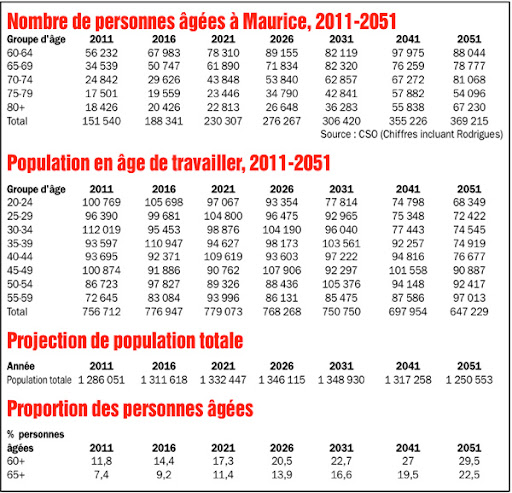Actual Population Issues In Mauritius

The theme this year is: "Longevity: building the future." Aging population also has major economic challenges.
Independence, participation, self-fulfillment and dignity of older persons: beyond these social objectives, the aging population is an important development issue that requires immediate and adequate measures.
By 2020, the number of people aged 60 and over in the world has surpassed the billion, of which more than 700 million live in developing countries. The aging of the population has long affected the developed countries, but in contrast to Europe, where aging has been gradual, the phenomenon is rapidly developing countries as well as intermediate countries, including Mauritius. From a demographic point of view, the aging of the population is affected by mortality and fertility: more people reach old age and there are fewer births.
According to the Central Bureau of Statistics, the proportion of elderly (60 or older) is currently 11.8% of the total population (against 9% in 2000). This proportion will reach 20.5% in 2026 and 29.5% in 2051. If in 2011, there were 151,540 people aged over 60 years, this figure will double in 20 years to reach 306,420 (see table). In 2051, the projection for this age group is 369 215.
In contrast, the active population (20-59 years) was 756,712 in 2011, will see a slight increase of about 23,000 in 10 years, but then fall dramatically, reaching 750,750 in 2031 and 647,229 in 2051. This means that if today there are 5 people working for every retiree, this proportion is 2.5 to 1 in 2031 and only 1.75 to 1 in 2051. Cause for alarm!
The economic impact of an aging population has several components. First, there is the question of the payment of the universal pension. Aging becomes a headache for the government to provide funding for pensioners and health care spending, with a workforce that is declining year by year due to the declining birthrate.
With medical advances and improved living conditions, life expectancy continues. By cons, low birth rate caused by modern lifestyle that the workforce is declining. In 2010, the total budget for the payment of pension was Rs 6.2 billion.
GDP
While certainly increase public spending, the coffers will be a net decrease taxpayers to 2031 and 2051. The State will be obliged to review the welfare state, not to take on more debt. Gross Domestic Product (GDP) is likely to stagnate, seriously undermining the ambition to achieve a GDP per capita of $ 20 000 in 2020.
The impact on consumption
Retirement has an impact on consumption. In general, the 'seniors' post 2020 will not be the same as those of the past. On average, their situation will be better both physically and financially. These two elements are suitable for consumption. This will be the first cohort of seniors, enjoying a massive level of health and fitness levels (increase in total life expectancy and healthy life).
They have received extensive professional careers and also pay double sources within couples, given a large number of women at work and in positions of responsibility. For example, the 85,000 current employees of the public are entitled to a peaceful retirement financially in 20 or 30 years. Various sectors are closely linked to the retirement life insurance or pension plan, advanced medicine, entertainment, automotive, vacation homes or retirement and travel, among others.
Increasingly equipped with Internet, tomorrow's retirees will be much more consumer information technology and communication that older generations. The downside, because of health problems, it is an explosion of sales of medical products for seniors. In Japan, for example, sales of adult diapers exceed those babies.
Health
Living longer is both a sign of progress and a constant challenge. Because of the number and the increasing proportion of older people in developed countries and developing countries, more and more people reach an age where the risk of chronic and degenerative diseases is significantly higher. Aging represents a major new problem for public health, both nationally and internationally. In 2020, the UN predicts that three-quarters of deaths in developing countries could be related to aging.
It is apparent from population surveys conducted in several African countries, the prevalence of hypertension and diabetes increases. Seychelles, there are 22% hypertensive, 16% South Africa, Mauritius 14%, while the proportion of diabetics is between 4 and 15% of the population in these three countries.
It is also expected that the aging population aggravates the extent of mental health problems, due to the increasing life expectancy of people with mental disorders and ever larger numbers reaching an age at which one is more exposed. The number of cases of dementia in Africa, Asia and Latin America, estimated at 29 million, could exceed 55 million by 2020. Achieving the vision and vision loss increases sharply with age. The role of cataract in this regard is well known. If she can have various origins, cataracts remains mostly related to aging.
Foreign workers
A drastic decrease in the population of working age will cause a shortage of labor in the country. At a time when the debate was launched on the need to use foreign workers, it seems that the country will need foreign labor for a long time. With the doubling of the elderly, there will certainly be an acute shortage of paramedical staff and patients guards among others.
On the other hand, it also takes people active in other sectors of the economy. Frankie Tang, economist, the government has already set up its recruitment of foreigners for 25 years ahead, anticipating future demand and supply. Strategic planning is required. However, advances in technology and automation in our industry may require less labor, but an economy based mainly on the services will still need labor-intensive.
Chandan Jankee: "The welfare state has done his time"
Chandan for Jankee economist, the country can not sustain the expenses incurred by an aging population, if there is no constant growth. "We must begin by reviewing the pension and subsidies universal, gradual introduction of a system of targeting, while ensuring efficiency and protection of the most vulnerable people. Must also calculate the minimum vital, "he says.
Chandan Jankee also deplores the lack of efficient technicians able to advise the government on public expenditure. "In Mauritius, we have a system of inefficient public services that increase costs, does not meet the population must still pay elsewhere. With today's data, the future aging will be difficult to manage without appropriate reform, but if in the future the country has new sources of revenue and increased productivity, the problem does not arise " .
Steps
The extension of the retirement age is one of the key measures that some countries have put in place. United States, the retirement age is 67 years. In Japan, employees retiring at age 69. England is 65. In Mauritius, the project to raise the retirement age to 65 years is already underway and will be gradual. Experts advocate further extend the contribution period required to receive a full pension. Some countries have developed measures to discourage early retirement.
- Over the next quarter century, Europe should remain the region the "older". Currently, seniors make up about 20% of the total population, and the proportion will reach 25% by 2020.
- The country "the oldest" in 2020 is Japan (31% of the elderly), followed by Italy, Greece and Switzerland (over 28%). At present, countries where the proportion of elderly is higher, are Greece and Italy.
- In 2020, the proportion of the population aged 60 and over is expected to reach 23% in North America, 17% in East Asia, 12% in Latin America and 10% in South Asia.
- In 2020, five developing countries will be among the ten countries with the largest number of people, namely China (230 million), India (142 million), Indonesia (29 million), Brazil ( 27 million) and Pakistan (18 million).
Rishi Callychurn, social worker: "Nature will bring the solution"
Callychurn for Rishi, president of the NGO Greenlife, it should be left to nature to solve the problem. "The aging population is a natural phenomenon, and there is nothing to worry about. Anyway, I wonder if a good proportion of the population would have the opportunity to age, given the various scourges that afflict the population, such as drugs, smoking, alcoholism, diabetes, hypertension, crime, stress, cost of living, accidents, among others, without the authorities to find solutions. "






